-
Candide
Voltaire, Adrien Moreau, Philip Littell, J. M. Wheeler
Paperback (Digireads.com, June 1, 2016)“Candide” is Voltaire’s most famous work, a satirical masterpiece, which was first published in 1759. It is the story of its central character, the titular Candide, who lives a sheltered comfortable life and has been indoctrinated into the philosophy of Leibnizian optimism, by his mentor, Professor Pangloss. When Candide travels throughout the world he begins to witness the pervasive hardships of life, an experience that leads to his ultimate disillusionment with Leibnizian philosophy. Through this clever narrative Voltaire refutes the philosophy of Gottfried Wilhelm Leibniz, whose central idea was that despite the apparent imperfections of the world, it was the best of all possible worlds because it was created by an all powerful and all knowing God. Voltaire found this philosophy insultingly ridiculous and within the humorous and satirical construct of this work he effectively exposes the idiocy of a philosophy that was so pervasive in his time. “Candide” is a fast-moving and fantastical tale which established Voltaire as not only one of the most important but controversial authors of his time. This edition is illustrated by Adrien Moreau, includes introductions by Philip Littell and J. M. Wheeler, and is printed on premium acid-free paper.
-
Candide
Voltaire
Paperback (Chump Change, April 22, 2017)Unabridged English version of Candide by Voltaire, offered here for chump change. A book for those desiring to contemplate life, Voltaire subtly challenges the reader’s complacent view of the world through extreme, and often gruesome, exaggeration.Written in 1759, it tells the story of Candide, who gets kicked out of the castle, forced to serve on a boat, shipwrecked, robbed, tortured, and on and on, without losing his desire to continue forward in life.ContentsI: HOW CANDIDE WAS BROUGHT UP IN A MAGNIFICENT CASTLE, AND HOW HE WAS EXPELLED THENCE. 3II: WHAT BECAME OF CANDIDE AMONG THE BULGARIANS. 3III: HOW CANDIDE MADE HIS ESCAPE FROM THE BULGARIANS, AND WHAT AFTERWARDS BECAME OF HIM. 5IV: HOW CANDIDE FOUND HIS OLD MASTER PANGLOSS, AND WHAT HAPPENED TO THEM. 6V: TEMPEST, SHIPWRECK, EARTHQUAKE, AND WHAT BECAME OF DOCTOR PANGLOSS, CANDIDE, AND JAMES THE ANABAPTIST. 7VI: HOW THE PORTUGUESE MADE A BEAUTIFUL AUTO-DA-FÉ, TO PREVENT ANY FURTHER EARTHQUAKES; AND HOW CANDIDE WAS PUBLICLY WHIPPED. 8VII: HOW THE OLD WOMAN TOOK CARE OF CANDIDE, AND HOW HE FOUND THE OBJECT HE LOVED. 9VIII: THE HISTORY OF CUNEGONDE. 10IX: WHAT BECAME OF CUNEGONDE, CANDIDE, THE GRAND INQUISITOR, AND THE JEW. 11X: IN WHAT DISTRESS CANDIDE, CUNEGONDE, AND THE OLD WOMAN ARRIVED AT CADIZ; AND OF THEIR EMBARKATION. 12XI: HISTORY OF THE OLD WOMAN. 13And More! All 30 Chapters!
-
Candide
- Voltaire, Jack Davenport
Audio CD (AudioGO, Nov. 13, 2012)Candide, published simultaneously in five European capitals in 1759, became an instant bestseller and is now regarded as one of the key texts of the Enlightenment. Voltaire’s preoccupations with evil and with various kinds of human folly and intolerance found a perfect vehicle in the philosophical tale. A master storyteller, he combined often wildly entertaining action with profoundly serious sense, parodying the traditional chivalric and oriental tales with which his public was more familiar to create a witty allegory of a young man whose optimism gives way to disillusionment after a series of terrible misfortunes.
-
Candide
Voltaire
Hardcover (Simon & Brown, Oct. 15, 2018)None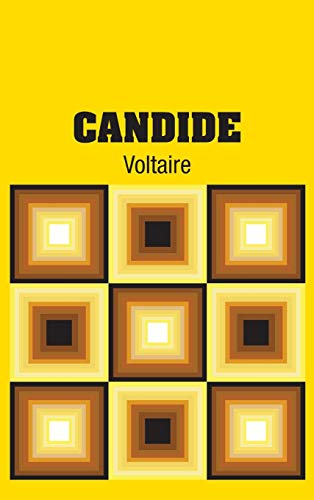
-
Candide
VOLTAIRE
Leather Bound (FRANKLIN LIBRARY, March 15, 1983)From review - "Candide, ou l'Optimisme is a French satire first published in 1759 by Voltaire, a philosopher of the Age of Enlightenment."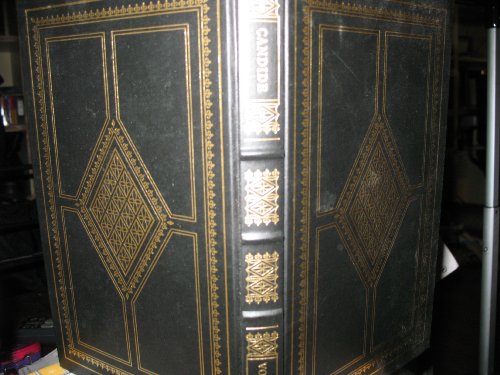
-
Candide
Voltaire
Paperback (Value Classic Reprints, Jan. 11, 2017)Unabridged English value reproduction of Candide by Voltaire, is a book that belongs on the shelf of those desiring to contemplate life. Voltaire subtly challenges the reader’s complacent view of the world through extreme, and often gruesome, exaggeration.Written in 1759, it tells the story of Candide, who gets kicked out of the castle, forced to serve on a boat, shipwrecked, robbed, tortured, and on and on, without losing his desire to continue forward in life.This Value Classic Reprint provides a slim volume with full text at an affordable price.
-
Candide
Voltaire
Mass Market Paperback (Simon & Schuster, June 1, 2005)Enriched Classics offer readers accessible editions of great works of literature enhanced by helpful notes and commentary. Each book includes educational tools alongside the text, enabling students and readers alike to gain a deeper and more developed understanding of the writer and their work.A classic work of eighteenth century literature, Candide is Voltaire’s fast-paced novella of struggle and adventure that used satire as a form of social critique. Candide enlists the help of his tutor, Dr. Pangloss, to help him reunite with his estranged lover, Lady Cunegonde. But the journey welcomes many unexpected challenges, and overcoming or outwitting the dangers of the world shall be their greatest task. Enriched Classics enhance your engagement by introducing and explaining the historical and cultural significance of the work, the author’s personal history, and what impact this book had on subsequent scholarship. Each book includes discussion questions that help clarify and reinforce major themes and reading recommendations for further research. Read with confidence.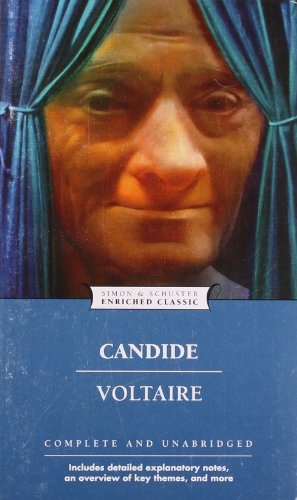
-
Candide
Voltaire
Leather Bound (Easton Press, March 15, 1977)Collector's Edition Bound in Genuine Leather.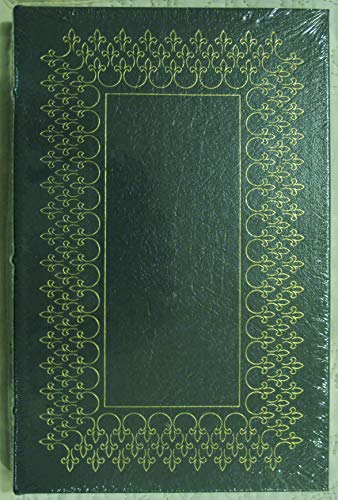
-
Candide
Voltaire, Arcadian Press
eBook (MVP, Aug. 23, 2017)Candide, ou l'Optimisme (1759) is a French satire by the Enlightenment philosopher Voltaire, English translations of which have been titled Candide: Or, All for the Best (1759); Candide: Or, The Optimist (1762); and Candide: Or, Optimism (1947). The novella begins with a young man, Candide, who is living a sheltered life in an Edenic paradise and being indoctrinated with Leibnizian optimism (or simply optimism) by his tutor, Pangloss. The work describes the abrupt cessation of this existence, followed by Candide's slow, painful disillusionment as he witnesses and experiences great hardships in the world. Voltaire concludes with Candide, if not outright rejecting optimism, advocating an enigmatic precept, "we must cultivate our garden", in lieu of the Leibnizian mantra of Pangloss, "all is for the best in the best of all possible worlds"
-
Candide
SparkNotes
eBook (SparkNotes, Aug. 12, 2014)Candide (SparkNotes Literature Guide) by Voltaire Making the reading experience fun! Created by Harvard students for students everywhere, SparkNotes is a new breed of study guide: smarter, better, faster.Geared to what today's students need to know, SparkNotes provides:chapter-by-chapter analysis explanations of key themes, motifs, and symbols a review quiz and essay topicsLively and accessible, these guides are perfect for late-night studying and writing papers.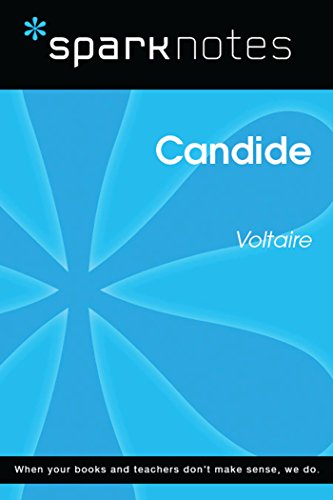
-
Candide
Voltaire
Hardcover (Value Classic Reprints, Jan. 11, 2017)Unabridged English value reproduction of Candide by Voltaire, is a book that belongs on the shelf of those desiring to contemplate life. Voltaire subtly challenges the reader’s complacent view of the world through extreme, and often gruesome, exaggeration.Written in 1759, it tells the story of Candide, who gets kicked out of the castle, forced to serve on a boat, shipwrecked, robbed, tortured, and on and on, without losing his desire to continue forward in life.This Value Classic Reprint provides a slim volume with full text at an affordable price.
-
Candide
Voltaire
Paperback (CreateSpace Independent Publishing Platform, March 25, 2016)Candide, ou l'Optimisme is a French satire first published in 1759 by Voltaire, a philosopher of the Age of Enlightenment. The novella has been widely translated, with English versions titled Candide: or, All for the Best (1759); Candide: or, The Optimist (1762); and Candide: or, Optimism (1947). It begins with a young man, Candide, who is living a sheltered life in an Edenic paradise and being indoctrinated with Leibnizian optimism (or simply "optimism") by his mentor, Professor Pangloss. The work describes the abrupt cessation of this lifestyle, followed by Candide's slow, painful disillusionment as he witnesses and experiences great hardships in the world. Voltaire concludes with Candide, if not rejecting optimism outright, advocating a deeply practical precept, "we must cultivate our garden", in lieu of the Leibnizian mantra of Pangloss, "all is for the best" in the "best of all possible worlds". Candide is characterised by its sarcastic tone as well as by its erratic, fantastical and fast-moving plot. A picaresque novel with a story similar to that of a more serious Bildungsroman, it parodies many adventure and romance clichés, the struggles of which are caricatured in a tone that is mordantly matter-of-fact. Still, the events discussed are often based on historical happenings, such as the Seven Years' War and the 1755 Lisbon earthquake. As philosophers of Voltaire's day contended with the problem of evil, so too does Candide in this short novel, albeit more directly and humorously. Voltaire ridicules religion, theologians, governments, armies, philosophies, and philosophers through allegory; most conspicuously, he assaults Leibniz and his optimism. As expected by Voltaire, Candide has enjoyed both great success and great scandal. Immediately after its secretive publication, the book was widely banned because it contained religious blasphemy, political sedition and intellectual hostility hidden under a thin veil of naïveté. However, with its sharp wit and insightful portrayal of the human condition, the novel has since inspired many later authors and artists to mimic and adapt it. Today, Candide is recognized as Voltaire's magnum opus and is often listed as part of the Western canon; it is among the most frequently taught works of French literature. The British poet and literary critic Martin Seymour-Smith listed Candide as one of the 100 most influential books ever written.